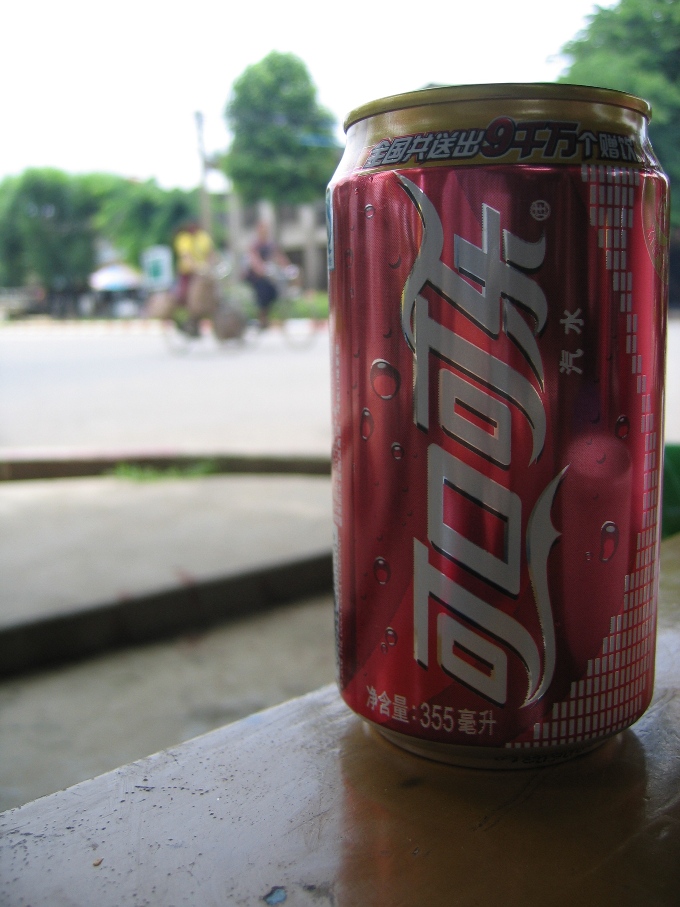This probably doesn’t surprise many of you out there in blogland, but in Burma, unlike Australia, Britain and Thailand, there is no local production of Coca-Cola. Cheap locally produced soft drinks, such as the delightful Star Cola, vie with expensive imported Coca-Cola for the affection of sweet-toothed drinkers. It is expensive because it must be “smuggled” in, either from China or Thailand. In upper Burma, the most convenient suppliers of Coke are just across the border in China. The Chinese Coke flows freely in bars and restaurants from Mandalay to Bhamo and beyond.
It will also come as no newsflash that the Chinese economy exerts increasing influence on the trajectory of development in mainland Southeast Asia. Across the region, and in all major segments of regional economies, Chinese economic strength is widely admired, and sometimes feared. Some, like garlic farmers in northern Thailand, are worried by the competition, while others, particularly the region’s entrepreneurs and traders, look north with naked ambition. Making money in China, or from China, seemingly excites almost everybody with a commercial bent. Who wouldn’t want a piece of the region’s most “exciting” economy?
In the West, and in the boardrooms of the world’s most powerful companies, executives have regularly decided to invest heavily in the dream of China’s untapped “potential”. These investments have often been facilitated by ambitious (and sometimes ruthless) advisers and partners who look on China as a personal and commercial quest – a challenge for their unique and boundless energies.
Mr. China, a 2004 memoir written by Tim Clissold, is about those few Westerners who seek to “become the ultimate China Hand, the only outsider…to crack China”. I picked the book up earlier today and read it straight through, cover to cover. It is a gripping read, which tracks the fortunes of the author and his Western partners as they make deals and lose money in the heady years of aggressive foreign direct investment that dragged the Chinese economy in to the international system. With investments in beer companies, rubber components’ manufacturers and other ventures, they tried, and largely failed, to impose their standards on the Chinese entrepreneurs and bureaucrats who become their “investment partners”.
The main sections of this book trace three emblematic (and problematic) investments that defined Clissold’s life for three years in the late 1990s as he struggled to hold it together through threats, strikes, ill-health and corruption. Many of the themes that he discusses are reminiscent of the far less satisfying account in The China Dream by Joe Studwell. In contrast to this other recently published work, Clissold teases out the human characteristics of a small cast of fascinating characters. Clissold’s is a much more personal story, where the author’s own mistakes and misjudgements easily fit into the chaos. It is easy to see how that chaos emerged. The patience and courage with which many of the serious disputes were apparently resolved is admirable.
Finishing Mr. China, I enjoyed the intended irony of the title. It flags the very serious problems that anybody claiming to “sell” expertise or special knowledge of different countries, cultures or economies inevitably faces. Knowing that, say, Chinese Coke is bought and sold in upper Burma is one thing. Knowing what that means in a historical, economic and political sense is much more complex. It takes a local feel. As Clissold could conclude, claiming to be Mr. China is about as sensible as taking the title of Ms. Europe or Mr. Asia. The problems of Clissold’s Mr. China show that local personalities, interactions and connections can be the most important part of any deal, no matter the country or the stakes involved.
 Facebook
Facebook  Twitter
Twitter  Soundcloud
Soundcloud  Youtube
Youtube  Rss
Rss 